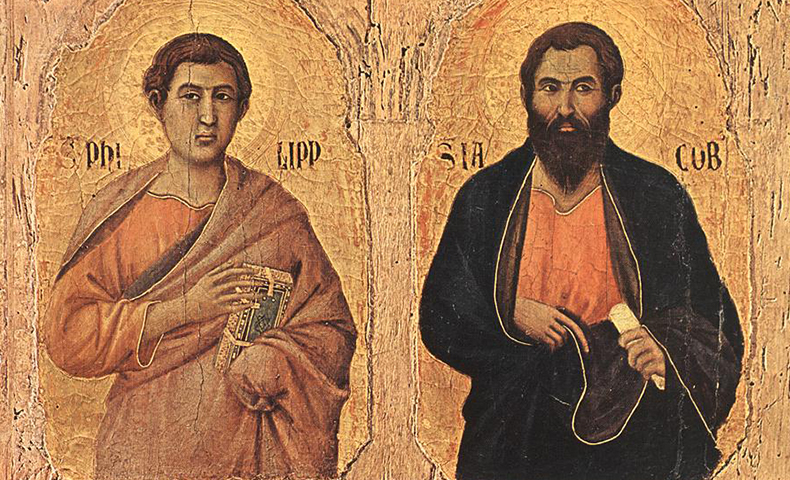
* * * *
Happy “First day of May, 2021!” Among other things, May 1 is the Feast Day for St Philip and St James, Apostles. (Or see Saint Philip and Saint James, from the Satucket website.) I last covered this feast day in St. Philip and St. James – May, 2020. I posted it on May 7, 2020 – almost a year ago – and noted that “we are now in the eighth full week of the COVID-19 pandemic.”
I also noted this bit of wisdom on how to “weather the storm,” advice from the 16th century:
“Keep quiet, work in solitude, outwardly conform, inwardly remain free.” Which as a result of the European wars of religion [in the the 16th century] created a figure new to Europe but “familiar in the great ages of China: the intellectual recluse.” (Which at this point evokes – to the writer anyway – the old Maynard G. Krebs repeated line, “You rang?“)
The point being that one way to weather a storm – like the ongoing COVID-19 pandemic – is become a kind of “intellectual recluse.” (Which brings up again Maynard G. Krebs‘ “You rang?“)
I’ll write more on last year’s post further below, but first I wanted to note some more “wisdom.” This from a post I did in February 2015, The True Test of Faith. Here’s how I summarized that “true test” in my 2018 E-book titled, “There’s No Such Thing as a Conservative Christian:”
* * * *
True Test of Faith talked about two Christians who die, then find out there is no God, no heaven, no afterlife, no reward for good behavior. The first one is outraged. “What? You mean I could have spent my life partying? Boozing it up? Chasing women, loose and otherwise? Boy am I mad, when I think of all those fun things that I could have been doing!”
The second Christian is a more thoughtful. He thinks of the path he’s followed. He thinks of his reading the Bible on a daily basis, thereby finding comfort and inspiration. He remembers how this process led him into some unexpected life breakthroughs, and on many true-life adventures. He thinks of all the “testing adventures” he’s had; some he passed, some he failed.
And after all this thinking about his life, his faith and his Bible-reading, the second Christian ends up saying, “You know, I wouldn’t change a thing.”
That’s the kind of faith I’m trying to develop. Of course, I do believe in God, and in Jesus. I also believe that “if you declare with your mouth, ‘Jesus is Lord,’ and believe in your heart that God raised him from the dead, you will be saved.” (Romans 10:9, emphasis added.) I’m just saying, that’s the kind of faith I’m trying to develop.
* * * *
And that could be the kind of faith that’s been tested – for a great many people – over the past year or so. Which may be why last year’s St. Philip and St. James – May, 2020 went off on so many tangents. (Looking for answers.) Like one answer from the 1759 novel Candide, by Voltaire. (In French, “il faut cultiver notre jardin.”) Or to simply “persevere,” meaning to persist or remain constant to a purpose, idea, or task in the face of obstacles or discouragement.
Which includes “the discipline of continuing our Daily Bible Reading.” Like honoring and remembering feast days for Saints like Philip and James the Lesser. (Together with the reason the two are remembered together.*) All of which reminds us of God’s love for all mankind as being universal. (Capable of “reaching even those beyond the pale – if not untouchable.”)
In other words, the point of Acts 8:26-40 – Philip and the Ethiopian eunuch – is that God’s Love is Universal. (See also Jonah and the bra-burners.*) So here’s to “Philip and James – Saints and Apostles,” and their Feast Day.
And furthermore, here’s to a loving God whose love is so universal that He is ready and willing to accept anyone. (Who turns to Him. See John 6:37.) Happy St. Philip and St. James day!
* * * *

* * * *
The upper image is courtesy of Weather The Storm Images – Image Results. It accompanies an article “How does climate change affect weather? – new briefing paper and podcast,” a 12/19/18 post from the Royal Meteorological Society, “UK’s Professional and Learned Society for weather and climate.”
Re: Saint Philip and Saint James. The full Daily Bible readings for the day include “AM Psalm 119:137-160, Job 23:1-12; John 1:43-51[;] PM Psalm 139,” along with Proverbs 4:7-18 and John 12:20-26.
Re: Last year’s post, St. Philip and St. James – May, 2020. While the instant blog platform listed the publication date as May 8, 2020, I actually posted it late on the previous evening, May 7, 2020.
Re: The 16th century. The quote in the main text is from historian Kenneth Clark‘s 1969 book Civilisation, “about what some people did during a time of great upheaval. (Like today’s.)” And as quoted from last year’s post on Saints Philip and James. See also Wikipedia, on that 16th century.
Re: Recluse, intellectual or otherwise. See Wikipedia, which noted “We live in a society that stigmatizes seclusion, yet has an almost rabid fascination with it at the same time. A survey of history shows that some of the most brilliant thinkers, writers and artists turned their backs on society to embrace a life of voluntary seclusion.”
Re: Why Philip and James are remembered together. See New Daily Compass:
The two apostles Philip and James the Lesser are remembered with a single liturgical feast because their relics, transferred respectively from Hierapolis and Jerusalem, were placed together in the Basilica of the Twelve Holy Apostles [“Santi Apostoli“] in Rome.
The lower image is courtesy of Saints Philip and James – Franciscan Media. Caption: “Image: Detail of reredos | Polytych by Maestà | Wikimedia.”